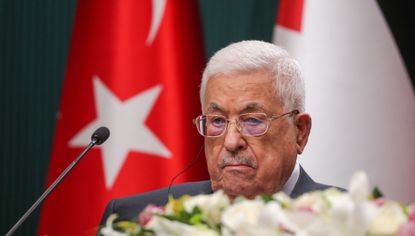What role the Palestinian Authority could play in Gaza after the conflict
Western diplomats are considering the PA returning to govern Gaza once the Israel-Hamas war ends

Western leaders are mooting a possible return of the beleaguered Palestinian Authority (PA) to govern Gaza and the West Bank following the conflict between Israel and Hamas.
But even if Hamas was ousted from Gaza, the notion of the PA as the "chosen rescue vehicle is unpopular", said The Guardian. It does not have "popular legitimacy" among Palestinian people, while Israeli prime minister Benjamin Netanyahu has already rejected the idea, despite it being backed by the US.
What is the Palestinian Authority?
The PA is a governing body that was set up in the 1990s as part of the Oslo Accords, a set of agreements between Israel and the umbrella organisation, the Palestinian Liberation Organization (PLO).
Subscribe to The Week
Escape your echo chamber. Get the facts behind the news, plus analysis from multiple perspectives.

Sign up for The Week's Free Newsletters
From our morning news briefing to a weekly Good News Newsletter, get the best of The Week delivered directly to your inbox.
From our morning news briefing to a weekly Good News Newsletter, get the best of The Week delivered directly to your inbox.
The intended peace talks to follow never happened and the accords now "lie in tatters", said Al Jazeera. Since that time, the PA has governed the West Bank and until 2006, the Gaza Strip. When Fatah, the PA's leading party, lost the parliamentary elections to Hamas in 2006, a brief civil war broke out and the PA was "expelled" from Gaza by Hamas the following year, said The Guardian.
Since then it has governed the West Bank with 88-year-old Mahmoud Abbas as its president. Abbas was elected in 2005 but has remained in his post ever since. In 2009, when his term ended, "Hamas declared Abbas illegitimate", said Al Jazeera, but he has "ruled by decree ever since".
How much power does it currently have?
The PA, in theory, remains in control of the West Bank and despite Hamas' rule, still runs "certain elements of life in Gaza, such as the health and education ministries and the banking system", said Al Jazeera.
Fatah "committed to recognition of Israel", said Steven Erlanger in The New York Times, but "a two-state solution seems like a fantasy to many" as the PA does nothing to prevent Israel's right-wing government from creating more Jewish settlements in the West Bank.
In the view of many Palestinians, the PA has become an "authoritarian, corrupt and undemocratic administration that sits on an iron throne built by Israel", Erlanger added. Even for those who have been born and raised in the "relative stability" of the West Bank, there is "little respect for the authority". Despite having little relative power, the PA's survival has been because of a "lack of alternatives".
Why are people not keen on its return?
Though few immediate alternatives exist, there is little faith that the PA in its current form could effectively govern Gaza and the West Bank once hostilities have ceased. Creating a "unified Palestinian entity is the stated US goal" once fighting is over, said Al Jazeera, but the PA is seen as in "collusion with Israel" by many Palestinians.
Even if Hamas were removed, the idea of returning Abbas to power as "champion of a reformed Palestinian politics seems a ridiculous proposition", said The Guardian. "Rehabilitating" the PA is required if the idea is to succeed, said The Atlantic, but that currently looks like a very tall order.
The return of the PA in Gaza also works on the assumption that Hamas will be completely removed. Those backing the political arrangement, like the US, could be "underestimating the resilience" of Hamas, said The Guardian. The militant group would also be likely to remain active in Gaza after the war and could still be "involved in any post-war negotiations", added Al Jazeera.
In Israel, there is unlikely to be any desire to push for the PA to take over control of Gaza, and Netanyahu has previously said the Israeli Defense Forces would remain there once the war has ended.
A future for Gaza's governance remains a complex and tricky issue to balance, particularly with no guarantees of the current war's outcome. But Western leaders are not "clueless" about the future of Gaza, concluded The Guardian, it may just have been "less daunting" if they had not "simply watched, or worse connived, in the PA’s slow atrophy".

Continue reading for free
We hope you're enjoying The Week's refreshingly open-minded journalism.
Subscribed to The Week? Register your account with the same email as your subscription.
Sign up to our 10 Things You Need to Know Today newsletter
A free daily digest of the biggest news stories of the day - and the best features from our website
Richard Windsor is a freelance writer for The Week Digital. He began his journalism career writing about politics and sport while studying at the University of Southampton. He then worked across various football publications before specialising in cycling for almost nine years, covering major races including the Tour de France and interviewing some of the sport’s top riders. He led Cycling Weekly’s digital platforms as editor for seven of those years, helping to transform the publication into the UK’s largest cycling website. He now works as a freelance writer, editor and consultant.
-
 5 X-plosive cartoons about Elon Musk
5 X-plosive cartoons about Elon MuskCartoons Artists take on his proposed clean-up of X, his views on advertisers, and more
By The Week US Published
-
 2023: the year of superhero fatigue
2023: the year of superhero fatigueThe Explainer The year may represent the end of an era for Hollywood
By Brendan Morrow, The Week US Published
-
 Recipe: roast garlic mushrooms with parsley and eggs by Gelf Alderson
Recipe: roast garlic mushrooms with parsley and eggs by Gelf AldersonThe Week Recommends A simple and classic breakfast combination
By The Week UK Published
-
 Remembering former US Justice Sandra Day O'Connor, the first woman on the Supreme Court
Remembering former US Justice Sandra Day O'Connor, the first woman on the Supreme Courtthe explainer O'Connor played a pivotal role on the bench and was regarded as the one of the powerful women of her era
By Theara Coleman, The Week US Published
-
 What's Qatar's role in the Middle East conflict?
What's Qatar's role in the Middle East conflict?Today's Big Question Doha hosts both Hamas and a U.S. military base. That puts it at the center of the conflict in Gaza.
By Joel Mathis, The Week US Published
-
 Should the US put conditions on Israel aid?
Should the US put conditions on Israel aid?Today's Big Question Democrats are divided on the issue
By Joel Mathis, The Week US Published
-
 Five solutions to the UK's housing crisis
Five solutions to the UK's housing crisisThe Explainer Levelling Up Secretary Michael Gove said the situation in Britain is 'worse' than most people think
By Richard Windsor, The Week UK Published
-
 Hamas to release Russian hostages as gesture of thanks to Putin
Hamas to release Russian hostages as gesture of thanks to PutinSpeed Read Show of appreciation follows release of Israeli-Russian national Roni Krivoi on 26 November
By Jamie Timson, The Week UK Published
-
 'Germs can, in fact, be good'
'Germs can, in fact, be good'Instant Opinion Opinion, comment and editorials of the day
By Harold Maass, The Week US Published
-
 How a long-term truce in Gaza could have ripple effects across the Middle East
How a long-term truce in Gaza could have ripple effects across the Middle EastTalking Point Israel and Hamas have recently agreed to extend their peace for two more days
By Justin Klawans, The Week US Published
-
 'American democracy now seems perilously close to the point of no return'
'American democracy now seems perilously close to the point of no return'Instant Opinion Opinion, comment and editorials of the day
By Harold Maass, The Week US Published










